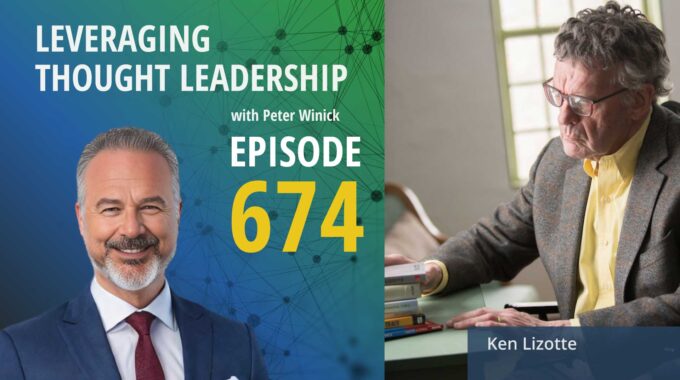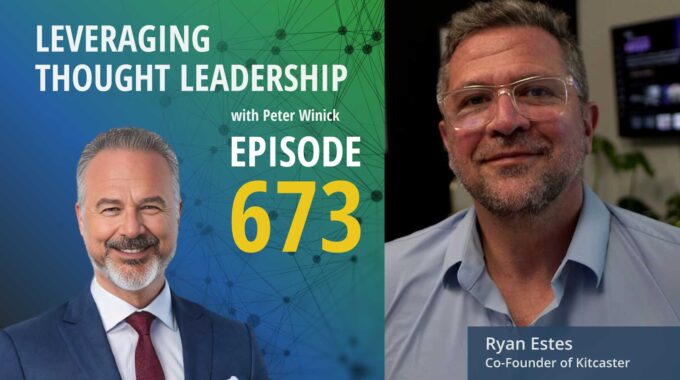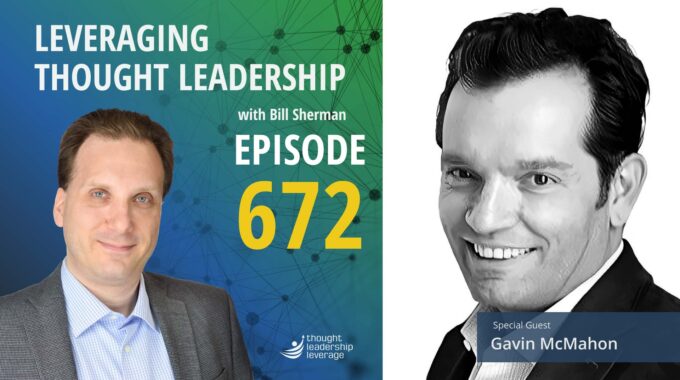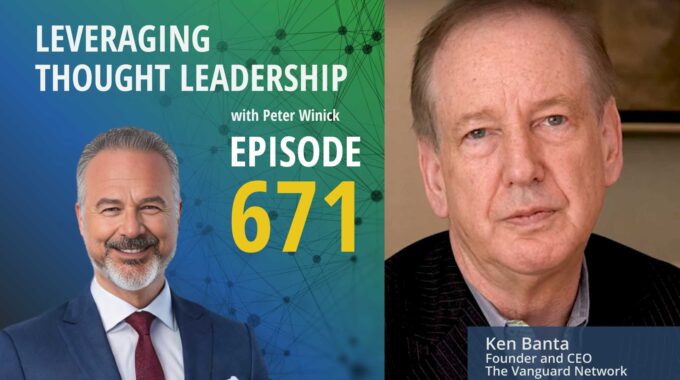Why Great Thought Leaders Don’t Play the Publisher’s Game Peter talks with publishing expert Ken…
Thought Leadership for Remote Teams | Larry English
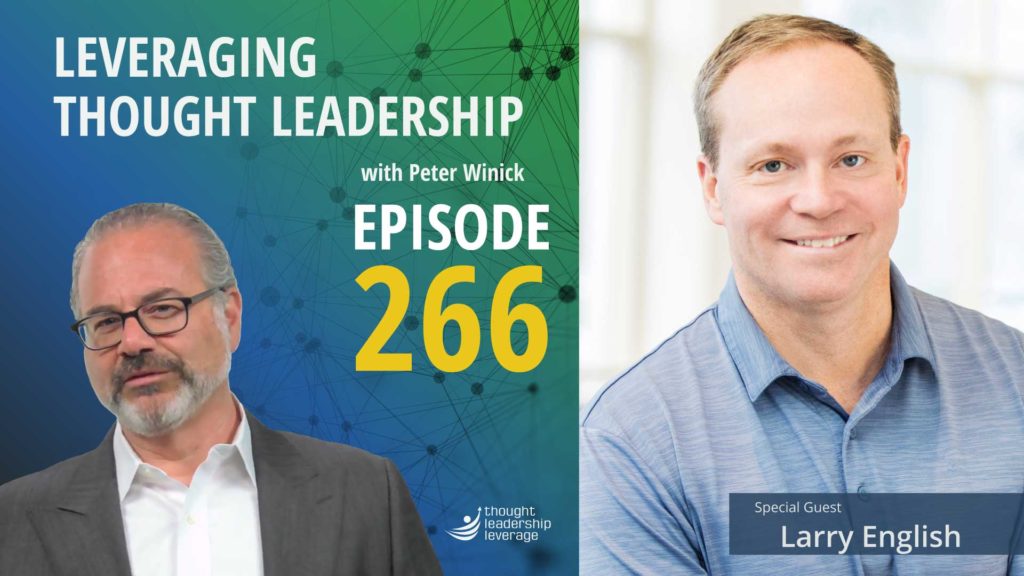
Using thought leadership to help organizations transition to a remote workforce.
An interview with Larry English about how he using 20 years of experience working with remote teams to help other organizations successfully make that transition.
Today’s guest is Larry English, president, and co-founder of Centric Consulting, a management consulting firm that guides organizations through complex digital business and technology problems. Also, Larry has recently written Office Optional, a timely book about moving from the office to remote working.
Larry explains how his book was in the works before COVID-19. He discusses what it is like to have a company that has been working virtually for 20 years. As well as, how they have cultivated a positive work culture and how they are teaching others to do the same.
We talk about the issues employees face when starting to work remotely. These issues include things like finding a work/life balance, managing the freedom of not being in an office, and avoiding disconnects between team members and even the organization.
We end the discussion conversing about understanding how a book can play into your business and why some actions that are important to do won’t have a measurable ROI. Then, we consider why producing content can give you an edge on your competition.
This is a great episode for anyone working in or managing an organization moving from onsite to virtual offices.
Three Key Takeaways from the Interview:
- Thought Leadership will play a huge part in maintaining the culture of an organization during the move to remote working.
- Not all thought leadership will have a hard ROI, yet the importance of your content will be immense.
- Thought Leaders should consider the breadth of their content and how it will play into the future of how people work and live.
Do you want to grow more opportunities as a thought leader? Contact Thought Leadership Leverage for assistance. We can help devise a strategy along with many other aspects such as research, sales, and marketing.
Transcript
Peter Winick Welcome, welcome, welcome. This is Peter Winick. I’m the founder and CEO of Thought Leadership Leverage. And you’re joining us on the podcast, which is Leveraging Thought Leadership. Today, my guest is Larry English. He’s the president and co-founder of Center Consulting, which is a management consulting firm that guides you in the search for answers to complex digital business and technology problems. Prior to center, he worked at a large international consulting firm and, as is typical, got burned out by 25. So today, Centric is a 1000 person plus company with locations in 12 cities and in India. Larry is a dad to four boys and a husband to an adventurous wife, and he resides in glorious Columbus, Ohio. So we go kind of ended on a low note with Columbus. I would frame that differently. Anyway.
Larry English We like to keep it a secret. We’re very.
Peter Winick Happy. I know. Exactly. Exactly. So anyway, here we go. So you fit into the category of I doubt when you introduce yourself to clients or colleagues or whatever, you introduce yourself as Larry, the author. Right. You’re known as the CEO and founder of Centric. But now we’ve added the Larry the author. So how does that like first, let’s start with why you chose to write the book and how that’s sort of aligned with the business goal where it’s a little bit different and how you’re sort of managing that sometimes a little bit of attention, but just sort of that.
Larry English Paul Yeah. So the reason I decided to write the book were there are a couple of reasons. One is we’ve been virtual a remote company for 20 years. In other words, for our culture. And I kept having to explain it over and over to executives. They’re like, I just don’t that doesn’t compute for me. I understand how that works. And we could start to see the technology was getting better. Clients were starting to be more accepting, and we saw it as the future of work. And so we knew that this was going to be a trend that was going to eventually take off. So it’s trying to get ahead of that trend a little bit. And then the pandemic happened and then all of a sudden, you know, everybody wanted to know, my gosh, you’re sponsoring.
Peter Winick Are you actually sponsoring Covid because you think you should be?
Larry English I was accused of being in Wuhan.
Peter Winick We won’t touch that area. Right.
Larry English Exactly. So it you know, obviously, you saw, you know, ten, 20 years accelerate into three months. And in all the things that I kept telling people like, no, this is a better way to work. You can trust your employees. Your employees are going to be happier. You can get just as much work done. You can have as good of a culture. They’re seeing that and they’re like, wow, this is amazing. I’d like to. This is working. I see the advantages. I would like to personally adopt this. And so we’ve been helping a number of companies figure out how to do that.
Peter Winick So let me ask you then. So prior to this, so you’ve always been a worker organization. That was a differentiator, right? And then if it came up in conversation, etc., etc.. But your business wasn’t in the you weren’t in the business of teaching mid-size consulting firms how to work remotely. It’s a it’s a capability. By the way, you just happen to have. Right. Has it now turned into a line of business or how does it support the business?
Larry English Yeah. So we have a people in change practice that we’ve had for a long time. And when this started to happen and we kept because I had published the book, people were like, you guys know what you’re doing? Please help us. And so we’ve actually translated that into a service offering. Okay. And so as you know, there’s a technology component to working remote, and then there’s the change in the people. And change part is usually the hardest and it’s usually two thirds of the work. And so we’re doing both of those. We’re helping team companies implement teams as an example. So the technology piece and then we’re helping them because you just can’t turn on teams and all of a sudden have a great culture and a great remote workforce. It is.
Peter Winick Sustained. Stay there for a minute because I think if you go back to the beginning of the pandemic, the first, you know, first everyone’s nobody volunteered. This is okay, congrats. There is no more office. You’re working from home. So that that first I don’t know exactly let’s call it 6 or 8 weeks. Most of the concern, the stress, the frustration from people outside of Covid not to disconnect that was the technology. OGs don’t have enough Wi-Fi. OGs do I have you know, do I, you know, whatever. And ultimately, I think you could sort of checklist most of that stuff. Okay. So in order to work from home, check this with your provider. Do this. We recommend this software, this tool, whatever. But if you’ve never done it before, it’s incredibly irritating and frustrating and compounded with everything else. Now, I think and this is where you alluded to the real issue isn’t, you know, teaching someone the etiquette of Zoom or whatever, but how do I maintain my culture, How do I maintain productivity? Like, there’s this whole new things that are basically all business problems given to us in a new form. And that seems to be where your years of experience, not as a. Consulting company that does this, but a company that lives this came to be.
Larry English Yeah. So it’s kind of gone in waves, as you just said. And so the second wave of what people are starting to realize is people. Their employees are becoming quickly disconnected. And the reason is because all the things that you have to do to stay connected and have a great virtual culture are all around people. And we figured that out and we’ve built that training. So we train our leaders on it, we measure it, we build it into how we operate the business. And so companies are running into all of those things and we’re like, Hey, we figured this out. Let us help you on how to do that.
Peter Winick Interesting. Interesting. So, so it’s sort of interesting now that you have grown that line of your business to help people do that, which probably started as a closet. Right. And was just a way for you to teach your people how to function.
Larry English That’s exactly right. And so it’s been serendipitous. I don’t see it going away. So it’s fascinating. I don’t know if you if you’ve seen out in Silicon Valley this week, you saw, gosh, Pinterest paid $95 million to get out of their contract for their new their new building. You saw ROI, you know, sell their brand new corporate headquarters. And so we actually have put together what we call a community of interest. We’re bringing a lot of these companies together. And in kind of all sharing confidentially, hey, this is the journey that we’re on and this is what we’re struggling with. Let’s help each other out. So it’s been it’s been great.
Peter Winick Well, and it’s interesting because a lot of these issues typically lived in h.r. And h.r. Is good. Agitate some folks unintentionally or not, but each is really good at telling us what not to do. Don’t do this. You can’t do this. You don’t do whatever. Not necessarily as good as adapting, being on the cutting edge. Being creative. Experimenting. Because what we’ve always done is always work. So I was talking to the head of HRT for large US company last week and it’s like, Wow, this whole world of best practices doesn’t work for us anymore because we’ve just had to hire X amount of people and onboard them without ever meeting them was like, Ooh, that would have been sort of a theoretical problem. You know, back in January, that’s a real problem now, like, so how do you know new problems above bubble.
Larry English Yeah. And what we’re seeing it is falling on the HRO. They are getting tasked with figuring this out and kind of in conjunction with the CIO. But definitely it is. It is falling to the sea hro. And we’ve been pleasantly surprised because what’s interesting is they’re the ones that are doing pulse surveys of their employees. And the surveys are coming back overwhelming. I love working from home. I’m not coming back into the office and make me I’m going to go get another job with somebody that will let me. And so the hours are like ours hours. We have to we’re going to have to do this. We’ve got to address this. This is going to be a big issue.
Peter Winick That’s crazy. Well, think about how many companies one of their at least perceived competitive advantage is, Ooh, we’ve got the cool offers. Ooh, we’ve got great food. You look, you know, we’re in the cool part of town or, you know, we’re in the mission. If we’re in San Francisco or Chelsea or in New York or whatever. Now, it’s like the best part of town is sort of down the hall from my bedroom. Right. So it’s hard. It’s harder. It’s hard to compete with that, you know?
Larry English Yeah. And we’re actually seeing I don’t know if you’ve seen this, but in New York, I think you’re in New York or Long Island.
Peter Winick Yeah, I’m in. I’m in New York. Yeah. Yeah.
Larry English We’re seeing the, the occupancy rates go, you know.
Peter Winick It’s frightening.
Larry English It’s pretty crazy. But it is transforming how things are done. So you’re seeing, you know, people move away from the big cities you’re seeing are now having to deal with, okay, do I pay this guy the same amount? And if he’s living in Columbus, Ohio, when he was living in New York, No, probably not. How do we handle that? So it’s having an incredible but the cool side of things are, my gosh, all this talent, when I thought I just had to, they had to be in New York City for me to be on the on the team. They can be anywhere now. And so it’s going to transform how companies operate for the better.
Peter Winick Yeah. And when I think different, I don’t say generations, but different people in different situations are experiencing it differently. So again, this conversation I have with the head of our company a couple of weeks ago was saying, okay, so now what? You know, again, I can tell you what not to do. Don’t ask, Larry about his religious beliefs or his practices or whatever. But now if I’m going to hire you and you’ve never met, I might say to you, Larry, could you walk me around on Face Time on your workspace to see if this looks, you know, like what it looks like because you representing the company, how much bandwidth do you have? Who else lives in the household and do they like where’s that line? I don’t know what right or wrong is in this domain. Where is that line between. No, I have a right and it’s actually an appropriate question versus, you know, if I were to hire you a year ago and say, hey, Larry, turn on face time and walk me around your house, you’re like, okay, peeping Tom, Bill, that’s clearly in the bucket. We don’t do that, you know?
Larry English Well, it’s really interesting that you’re bringing this up because what we found is the secret to a great remote culture is building deep personal relationships with everybody that you’re working with. And so it’s modeling vulnerability, being vulnerable. It’s talking about those, you know, your dogs and your cats and your family relationships. And because when you feel closer, you have a greater sense of trust. And so it you know, I don’t know where we’ve never had an issue with that from our perspective, but we know that we have to do that in order to be successful and stay connected. I don’t know.
Peter Winick If you’re enjoying this episode of Leveraging Thought Leadership, please make sure to subscribe. If you’d like to help spread the word about our podcast, please leave us a review and share it with your friends. We’re available on Apple Podcasts and on all major listening apps as well as at Thought Leadership Leverage dot com/podcasts.
Peter Winick Right. But let’s let me take the New York issue as an example. It is quite common in New York for young folks who are starting in their career and single 30 and under to live with one, two, three roommates. Right. And when they went into that situation, it was assumed everybody’s out of the house and 730 comes back at seven. You know, we’re not all here all day. It’s not really optimized for three people. You know, maybe one needs quiet time and one, you know, whatever. So now you have to rethink who you live with, how you live, the, you know, the heart, you know, the hardware of the place is it. Can two people be on a call at once? I think it’s a game changer. And more importantly, do I need to be paying $5,000 a month rent where I go to hours away as long as I have a good connection? Who cares?
Larry English I we’ve talked about we’re seeing what we’re calling the era of the individual because they have all this immense flexibility now of where they can live, how they work, who they work for, and how they manage their day, how they time slice their day. And a lot of them are equipped to do it. And so we’re actually developing training so these companies can actually train people to be great remote workers and learn how to do that.
Peter Winick Well. And I think that that that freedom scares a lot of folks because it was fairly easy when the routine was I got to my desk at 830 and I got my cup of coffee and I said, you know, and then I do that. I knew that whatever. Now it’s like, well, what if I want to jump on the peloton at 11? Is that a bad thing? No cares right now. You might get up a half hour earlier and do emails or after dinner do that. Like whatever. I have to be able to trust you and say, Larry, you’re an adult. You got to do what you got to do and get it done. And there might be days when you can’t do that Peloton thing because there’s a fire to pull out. But I kind of don’t care. And you know what? If that makes you happy, great. I think a lot of folks have also realized, A, they got the gift of the commute time back. I don’t know anyone that’s a college. You can’t wait to go sit in my car for a day, listen to listen to the radio. And there’s the productivity, the productivity tax that one pays for being in an office environment of the ritual. I meet you with the coffee machine and you and I check a little bit and then, what are you doing for lunch? I don’t know. I’ll get back to you. Whatever. And then it’s always Sheila is an accountant birthday. And so every week.
Larry English Yeah, it’s. It’s interesting. So there are a lot of studies right after that, you know, let’s say 2 or 3 months in and everybody’s productivity shot way up. And I’m like, you know what? Don’t count on that to stay because.
Peter Winick Not to sustain. Yeah.
Larry English Or stuck at home they’re working. What happens when people make the transition to work for them for the first time?
Peter Winick They don’t do it.
Larry English You got it right. And so you actually have to train them on how to do that. So you’re hitting on all of those things that we’ve encountered.
Peter Winick Yeah. Really? So if you were to give some thought or advice to someone in a similar situation that you that you’re in now, so this book would have happened with or without Covid. It was happening and you wanted to write the story, which is a unique story about your company of how it works remotely. And that probably would have been a nice thing for the company. Like, hey, you know, our CEO wrote a book and it’s sort of interesting. And, you know, maybe the sales folks will give it to a potential client, but it wouldn’t have been a game changer. It would have been a nice a nice thing. Yeah. Would have sold ten copies, right? Maybe 11. Right, Right. But it would have been like, you know, and Larry, and you would have felt good, like, hey, I wrote a book about our culture and maybe it’s part of the onboarding, but it would have been like not the highest priority, not a game changer, not or whatever. So what would you say to anyone out there and say, take stock of what you’re doing that might be of value to others and forget Covid for a moment. What is it that you that unique that’s special about you, your company, your experience or enterprise that might be interesting to others and doesn’t have to be a book? Maybe start getting out some thought leadership blogs, videos or any thoughts on that?
Larry English Yeah. So absolutely. So the reason that one of the reasons that you open this with that I started to write the book is because we knew to survive as an organization, we had to be great at thought leadership. And so we’ve been trying to do that. And so I said, okay, great, I’ll be the guinea pig, because I think this is a topic that is going to be important. And I’ll start to figure out how we do thought leadership. And we’ve actually developed, I think you that we’ve developed an internal program and yes, 3 or 4 people through it. So the lessons learned that we’ve learned from that and the business that we’ve gotten, you know, it’s extra special that just had happened with the with Alpha Optional and what happened, you know, it just blew up. But even if it had and there would have been benefit out of that because we’re on a long term journey to be great at thought leadership across our entire organization. And so we would have gotten the benefit.
Peter Winick So let’s stay on that for a minute. So there’s one piece of the thought leadership, eccentric that you wrote on the book. Right? And as the founders said, you got to own that. But I know because I’ve talked to several really wonderful folks at your company, there’s also different pieces of thought leadership that are more closely connected to what you do in your business and your clients and whatever that you don’t own for say, so what? How did you decide that thought leadership is a worthwhile investment for others in your company to spend a significant portion of their time on them? And how do you how do you keep your either that’s the tough part.
Larry English So there’s multiple things in there. We recognize that it’s you’re going to end up commoditized if you are not constantly on the leading edge.
Peter Winick Yeah.
Larry English And so if you’re doing that, you’re naturally going to get there anyway. So why not take the little bit extra step and build the methodology and the infrastructure to allow those people to get their voice out there? And it has been amazing to me. So, you know, taking off is optional. We are in in getting into clients that we would they would have never talked to us. And so, you know, this is a very unique piece and it’s put us out there as that leader and gives us it gives us a platform for this other stuff. Now, how do I measure that? How are we going to measure the KPI across our company? I would say we’re at the nascent stage, so I’d welcome any advice that you that you have. But, you know, ultimately I think it’s going to be hard because you’d want it to be translated into sales as an example. Yeah, I think that’s pretty hard to do. And I think if you do a little bit. So it’s one of those there’s a few things when you do a strategy that you just know you have to do and you’re not going to there’s not going to be a tangible ROI. But I’m still going to invest. I’m going to do that. And I kind of feel like this is a little bit one of those. And you’ve got to figure out.
Peter Winick Let’s play with that a little bit. So it’s it depends how we measure it. So one argument could be, wait a minute, you even know you had a handful, half a dozen talented people inside of the company that could develop and deploy thought leadership. And it and it’s hard and they want to. So one measurement could be talent, attraction and retention maybe, right? It’s a piece of it. If they had that thing burning in them and they didn’t get that satisfied there, they might have gone somewhere else. Right. The other thing could be, as you say, sales is sort of easy to measure. How do I differentiate? I mean, I think we’re all fighting this this commoditization wave. I don’t care what business you’re in, I don’t care what industry you’re in. You’re getting to market commoditized. So is it a cost effective tiebreaker to stand out from your competitors to show that you’re just a little bit more interesting, a little bit smarter, have something have a voice in the ground versus not having thought. Leadership versus not means I have a perspective and point of view versus not. Wouldn’t you want to deal with someone that does, you know?
Larry English And so two things. The examples I would give is we just recently hired a guy that is really respected as a technologist. People are going to. Come to our company because of it. It’s been it’s been amazing. And then we actually we sold a deal. And I was talking to the buyer and I’m like, why? You know, why did you pick us? And they’re like, You put out so much great content compared to your competitors. It’s clear that you guys, you know, you know what you’re doing. So to your point earlier, I can’t measure. I don’t know how to measure that.
Peter Winick Yeah. I mean, I’ve seen people I mean, there’s all sorts of ways that people do it weighted averages or contribution or, you know, there’s a point system for a download of a white paper versus bringing the creator into a meeting as part of this. I mean, none of them are what I would call sort of a heart and true measurement. I think you have to experiment and trust your gut a little bit and realize, like you said, it’s there an error on the side of giving it a little bit more credit than you could probably see because I think there is some sort of invisible, invisible but immeasurable, if you will, benefits.
Larry English Yeah, that’s helpful. Thank you.
Peter Winick Yeah. Yeah. Great. Well, this has been awesome. Any other your friends and family not treating you as? You’re so much smarter that you’re a published author. It’s usually I usually think it’s about a 30 point IQ bump that people get.
Larry English Well, I’ll tell you, my partner when I was writing the book before this, he’s like, This is the dumbest thing you’re ever done. And then after Covid hit, he’s like, That is so smart. Larry. You did an amazing job.
Peter Winick Wow. So you so you went from a dummy to a doer to a genius and 222 pages.
Larry English That’s fantastic. Exactly. And then the other thing is, my wife is just grumpy that because all I didn’t realize when I was writing this was like, hey, the amount of time that you put into writing that. The same amount is from promoter. And I’m like, no, I don’t believe you. yeah, that’s really true. And so it’s a ton of work and I think my wife’s like, okay, enough.
Peter Winick I, we could, if you’d like, edit out. My wife is just grumpy because that could be the tag for this. That could be the quote we accidentally pull. And that probably won’t work.
Larry English It’s perfectly fine. Okay. She would own it.
Peter Winick Okay. And it wasn’t a preexisting condition. You’re only for the cause of that. Sort of make sure or clarify. Cool. Well, this has been great. I appreciate your time and best of luck with it. It’s very is very cool. And it’s just sort of weird how Covid accelerated the adoption and all that. So, you know, we’re always looking for everybody. I think that obsessed with always think about who’s losing with Covid. And there are some unintentional unintended positive outcomes, which I guess is good.
Larry English Well, everybody’s got to do business digitally now. And so, yeah, we’re hiring people. I mean, we you know, it’s been good for us. I know a lot of people are hurting, but we’re grateful that it’s so good for us.
Peter Winick Great. Thanks for your time. Enjoy. Thank you. Thanks.
Larry English Bye bye.
Peter Winick To learn more about Thought Leadership Leverage, please visit our website at Thought Leadership Leverage dot com. To reach me directly. Feel free to email me at Peter at ThoughtLeadershipLeverage.com. And please subscribe to Leveraging Thought Leadership on iTunes or your favorite podcast app to get your weekly episode automatically.


